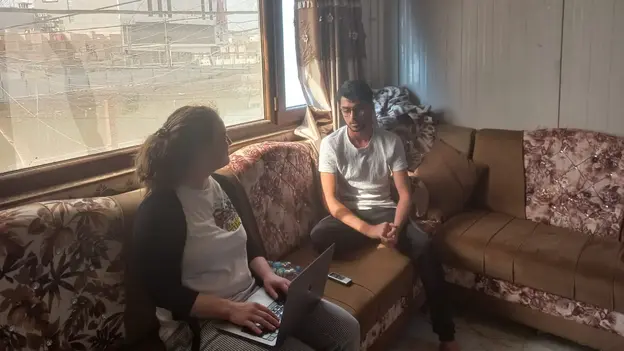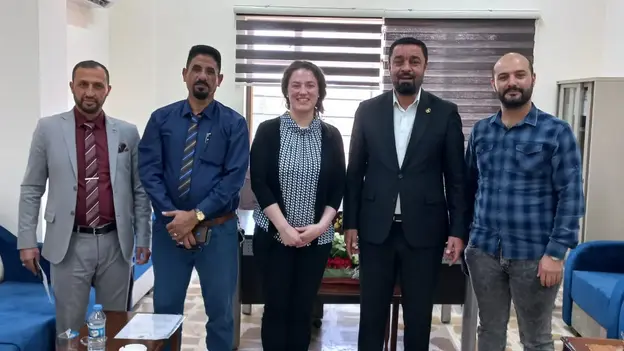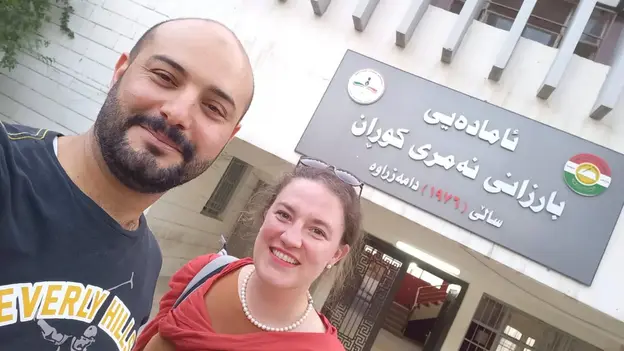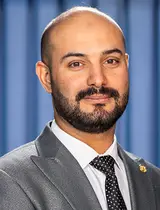Tandem Project
Education Under Contested Rule
Empirical Study
Iraqis have been subject to various educational settings in recent years, depending on the time and location of their school visit. This project aims to combine the field of education with that of contested governments and to set up an online database of legislation, curricula, and school books in the Iraqi education system between 2000 and 2022. Education is a sector in and through which various central governments, the US-led Coalition Provisional Authority, the Kurdistan Regional Government, ISIS, and other armed non-state actors tried to implement their respective agendas and exercise rule. They have issued decrees to reorganise how schools were run, reconfigured curricula and designed school books.
Navigating through the challenges posed by fluctuating governments and ever-evolving educational curricula, we witnessed first-hand the profound impact of wars and political conflicts on education.
AGYA member Abdulsatar Sultan
Education as a main site of violent contestation of epistemic authority
Education's significance in shaping the legitimacy and order-building efforts of actors in situations of armed conflict is often overlooked. Its critical role in maintaining the power of elites and reinforcing ideologies is underestimated. However, education can become a major battleground for violent conflicts, and having control over knowledge and information can be the most fundamental form of authority an actor needs to establish in order to pursue their objectives of creating order.
If the knowledge and information provided by a governing actor cannot be trusted, it becomes challenging for them to establish political authority. When people doubt the credibility of the knowledge being disseminated, the legitimacy of the governing actor comes into question. Therefore, education and the authority over knowledge are essential elements in the process of building and maintaining political authority in conflict-ridden environments.
Multi-layered governance between coercion and service provision
In the discussion about civil war and armed conflict, there is a growing interest in understanding the intricate network of different actors involved in various conflict zones, referred to as 'multi-layered governance.' These actors include the state and its representatives, rebel groups, external state and non-state interveners like military alliances, international organizations, and NGOs, as well as organized and unorganized civil society. Additionally, the influence of actors outside the conflict zone, like diaspora communities, can further complicate the situation. The areas of authority and influence of these actors overlap both in space and time, leading to civilians experiencing various forms of control, coercion, service provision, and calls for participation from different actors simultaneously. This complex interplay of actors makes the dynamics of conflict and governance in such contexts highly intricate and challenging to navigate for civilians and others involved.
In this project, Dr. Abdulsatar Sultan and Dr. Hanna Pfeifer focus on the relation between education and multi-layered government and the role that education plays in shaping and influencing the dynamics of governance in complex conflict zones and societies with various actors involved. Education plays a pivotal role in multi-layered government contexts by influencing power dynamics, promoting social cohesion, contributing to conflict resolution efforts, and empowering civil society to actively participate in governance and, even, peacebuilding processes. It can serve as a critical tool for promoting stability, inclusivity, and sustainable development in regions affected by armed conflict and complex governance challenges.
Combining Abdulsatar’s insider perspective with my outsider’s view on this intricate field creates a unique opportunity. This collaboration emphasizes the significance of tandem projects like ours as a valuable format for gaining comprehensive insights and understanding.
AGYA member Hanna Pfeifer
Easy access database for local and international research on education in Iraq
As part of this project, AGYA members Hanna Pfeifer and Abdulsatar Sultan have conducted an extensive field study in Erbil and Mosul, Iraq, seeking to collect, process, and structure data on the educational sector in Iraq. While single studies on education in Iraq exist, a comprehensive database on what happened to the educational sector between 2000 and 2020 is not yet available. The database will help to mitigate this lack of documentation by compiling decrees, legislation, curricula, and school books shaping the Iraqi education system within that time frame. This is of particular importance as this timespan contains several phases of contested rule, emphasizing the interrelation between governance and education. By making the database accessible to local and international researchers in an envisioned follow-up project, more research on this important aspect of the interrelation of contested governance and education in Iraq will be facilitated.
- Disciplines Involved
- Political Science, Business Administration
- Cooperation Partners
- Goethe University Frankfurt
- Peace Research Institute Frankfurt
- Catholic University in Erbil, Iraq
- Project Title
- Schools Under (Violently) Contested Rule: Mapping the Iraqi Education Sector Between 2000 and 2022
- Year
- 2023
- Funding Scheme
- Tandem Project
- Countries Involved
- Germany, Iraq




